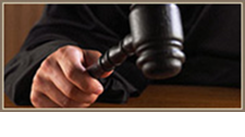Criminal Defense
At the criminal defense firm of Lea P. Krauss — a former prosecutor — we bring a wealth of experience in not only the practice of law, but also law enforcement and hands-on investigation. This experience gives us the edge when dealing with police and prosecutors.
A qualified criminal defense lawyer from our firm will personally handle your case with the support of our entire legal staff. We will make sure you understand your rights, your options, and their consequences before making decisions that could affect your future, your freedom and your criminal record.
Criminal Process:
I. The Arraignment.
The arraignment is the first court appearance that you must attend after formal charges are filed against you by the State Attorney’s Office. When you are initially stopped and arrested, several things that may happen include: You may be released and told you will receive notice of an arraignment date in the mail; you may be released with a court date; or you may be held in custody until the arraignment date.
Your presence at the arraignment hearing may be waived under certain circumstances, once you retain an attorney. Your attorney will enter a plea of not guilty at the arraignment or prior to the hearing. Even if the evidence against you appears to be overwhelming, your attorney is entitled to see all of the evidence before making a decision that will affect the rest of your life.
II. The Pre-Trial Conference
The pre-trial conference is an informal hearing, also known as a calendar call, status hearing or a sounding hearing. If your case is a misdemeanor, most judges will allow your attorney to appear on your behalf. During the pre-trial conference, the prosecutor meets with the defense attorney to discuss the case. This gives both sides an opportunity to explore plea bargaining options and to make sure that both sides have exchanged all the evidence, also known as discovery, as required by the court.
III. The Pre-Trial Motions.
In some cases, there are pre-trial motion hearings. At these hearings, the defense presents legal arguments generally asking the judge to exclude some or all of the evidence in your case. Witnesses are often called to testify, including the arresting officers, to determine if your detention and arrest were lawful. If the judge rules in favor of your motions, evidence will be suppressed and often the case will be dismissed.If the case is not dismissed after the pre-trial motions, then the case is scheduled for another pre-trial conference.
IV. The Trial.
In most cases, you have the right to a jury trial. Six people from the community will be called upon to make a judgment in your case. After your attorney has reviewed all the evidence in your case, you will discuss whether trial is the best option. Ultimately, the decision to go to trial is yours.
VI. Sentencing.
If you are convicted after trial or after entering a plea, a sentencing hearing is set to determine how you should be punished. In some cases, your attorney can appear on your behalf to enter your plea, and you don’t have to appear for the sentencing.
VI. The Appeal.
If you are convicted, you have the right to appeal that verdict. This appeal is taken to the superior court in the county where the trial was held. You must appeal a judgment against you within 30 days, or you waive the right to appeal.
 What Sets Us Apart
What Sets Us Apart
Our firm focuses on providing well-grounded, innovative solutions to your legal problems or those of loved ones. We are known not only for the high quality of our legal work, but also for the personal service we provide.

